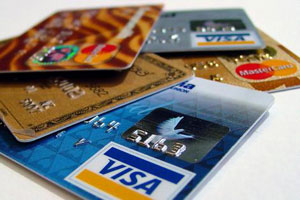 In business, as in war, it seldom pays to attack a powerful and well-entrenched adversary head-on. A successful assault is more likely to come from an unexpected, and less well-defended, direction, or from a source that is not perceived as a threat until too late.
In business, as in war, it seldom pays to attack a powerful and well-entrenched adversary head-on. A successful assault is more likely to come from an unexpected, and less well-defended, direction, or from a source that is not perceived as a threat until too late.
MasterCard (MA) and Visa (V) have long been the payment-processing industry’s entrenched powers. With a firm grip on consumers’ wallets and merchants’ card machines, the two mass-market card brands have steadily increased their take as the middlemen in transactions totaling hundreds of billions of dollars every year. American Express staked out a small piece of turf at the top end of the market, but despite decades of support from deep-pocketed parents, Discover Financial Group’s rival processing network has barely made a dent, even though it usually offers a better deal.
But AT&T Inc. (T) and Verizon Wireless have emerged as potential allies that can help Discover break through the Mastercard-Visa Maginot Line. The two wireless providers are working on a plan that would allow U.S. consumers to make payments using their mobile phones. T-Mobile also reportedly wants to work with Discover and Barclays PLC.
Using mobile phones for payments is not a new concept. A recent study by Gartner Research estimated that more than 108 million people worldwide will use mobile payments this year. However, until now, U.S. interest has been limited. In the developing world, where many people lack bank accounts or credit cards, mobile payments are easily attracting consumers who previously relied on cash. In the U.S., however, companies interested in offering mobile payments must contend with the powerful credit card industry.
As plastic has supplanted paper in this country, credit card companies have reaped the profits. According to the Nilson Report, as cited by Bloomberg, cards and electronic payments are now used for more than half of U.S. consumer purchases. In 2003, only 36 percent of purchases were paid for this way. As a result of all this swiping, Visa’s annual operating income has grown sixfold since fiscal 2005 to $3.54 billion last year. MasterCard’s annual take has increased more than fivefold to $2.27 billion.
Most of the profits come directly from merchants, who must pay in order to use the companies’ services to process payments. Our small business, for example, pays a standard “discount” fee of around 2.5 percent whenever we accept a payment by Visa or MasterCard. We also pay “interchange” fees, which can be another 2 to 3 percent, on corporate cards, rewards cards and international cards.
Our business is not exactly a huge burden for the card companies. We tend to have a very small volume of transactions, each with a high dollar value. We have not had a single chargeback or fraud claim in 18 years. Businesses that can’t offer card companies these advantages pay even more than we do.
Companies generally pass these costs on to consumers in the form of higher prices. But consumers happily swipe away without realizing that they are indirectly paying for the privilege.
With little competition, the proliferation of fees has remained largely unchecked. Technological innovation may put an end to that, however, as new ways of processing payments allow mobile phone companies and others to challenge today’s titans.
If AT&T and Verizon (VZ) succeed, more companies may be tempted to enter the payment processing market. For online transactions, Paypal has long provided an alternative to credit cards, but it is currently a non-factor in the offline world. Encouraged by other new players in the payment business, it may make the leap into bricks and mortar. Large vendors like Google (GOOG), Microsoft (MSFT) and Apple (AAPL) might market their own payment systems to small businesses. Intuit, the maker of Quicken and Quickbooks, is another potential player.
As more companies get into the business, processing fees for merchants should be driven down. Lower costs will allow retailers to hold the line on prices so consumers can share in the good fortune.
However, all this potential innovation must make it past the regulators first. In May three economists from the Federal Reserve Bank of Boston issued a policy paper offering some suggestions on how to encourage the development of mobile payments.
Uncertainty over regulations “inhibits potential market participants and intensifies the confusion over which entities have a chance at owning the customer relationship or how such ownership might be shared,” the authors said. They went on to recommend that “The Federal Reserve could address this issue by convening a group of regulatory agencies to start planning potential regulatory changes in advance of the widespread adoption of mobile payments and by raising the issue with legislators and the administration.”
The Fed would not be the only one seeking the attention of Congress and the White House. It’s a safe bet that the entrenched card companies and the many banks that draw huge profits from the credit card business will make it a top lobbying priority to set up as many barriers to competition as possible.
It’s still too soon to tell how the payment processing business will evolve and what role smartphones and other new technology will play. But AT&T and Verizon’s planned experiment is a welcome first blow against the card companies’ fortifications.


Leave a Reply